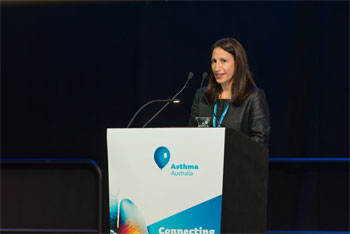Michele Goldman Back to School Asthma Interview

Parents Warned to Be Prepared for Back to School Asthma Flare-Ups
As children prepare to head back to the classroom, parents have been urged to put their child's asthma action plan at the top of the back to school list.
TerryWhite Chemmart pharmacist Kevin Tong said back to school time traditionally saw a spike in asthma flare-ups, resulting in increased hospital visits and days off school.
"Triggers for asthma flare-ups can include but are not limited to colds and respiratory infections, reduced asthma management over the holiday period and a change of environment or allergens," Mr Tong said.
"An asthma flare-up can come on slowly, over hours, days or even weeks, or very quickly over minutes.
"By coming into your local pharmacy, we can provide advice and support to better manage your child's asthma before flare-ups happen, while also helping you to comply with any school requirements.'
Balgowlah mum, Louise Fletcher, knows all too well the implications of not being prepared for an asthma flare-up, after her daughter, Bianca, had an asthma attack at school.
"Just over a year ago, Bianca suffered an asthma attack at school, however, the teacher didn't initially realise what was happening. That was a very real wake up call for us," Mrs Fletcher said.
"So now, before she goes back to school, I always have a meeting with her new teacher so they are aware that she has asthma and also the steps to take to ensure Bianca is treated correctly, using her Asthma Action Plan.
"Bianca's asthma is triggered by a cold or flu virus so the end of the first term is when she will most likely need medication, and we always keep Ventolin and a spacer at the school office and in her school bag."
Asthma Australia CEO Michele Goldman said it is vital for all children who have asthma to have an Asthma Action Plan in place.
"These plans can be life-saving, yet are only used by approximately 41% of children under the age of 15, which means many children may not be given the best treatment when suffering from an asthma flare-up" Mrs Goldman said.
"Asthma plans should be reviewed and updated regularly with a GP as asthma does change over time and treatment may need to be adjusted for the best health outcomes.
Pharmacists should be consulted to purchase the necessary medication, spacer, or spacer with mask. Pharmacists can also check device technique to ensure your child is using their medication correctly.
"The school should be given a copy of the asthma plan as well as the reliever and spacer for use if a flare-up occurs at school."
The Back to School asthma campaign kicks off a new 3 year partnership between TerryWhite Chemmart and Asthma Australia.
Mrs Goldman said, "Pharmacists are often the first point of contact for people with asthma in the community and this partnership is an excellent way for us to continue growing the support offered."
To ensure children are aware of the importance of sticking to their Asthma Action Plan, TerryWhite Chemmart pharmacists will be giving out FREE spacer -label stickers' with a choice of two fun designs as well as a fun bag tag/keyring in readiness for school.
Asthma Back to School Checklist
1. Review and update your child's Asthma Plan with your GP
2. Visit your local pharmacist to purchase your child's reliever medication and a spacer
3. Share your plan with the school and provide them with a spare reliever in case of an asthma attack
Interview with Michele Goldman, CEO of Asthma Australia
Question: Why do we usually see a spike in asthma hospitalisations when children return to school?
Michele Goldman: This pattern is consistent with international studies that show there is a peak in asthma hospitalisations after the long summer school holiday break in other countries too. Our asthma experts tell us that major contributing factors include;
When children return to school they are exposed to a larger number of respiratory viruses as they are mixing with a larger number of peers after the school break so are more at risk of colds and flu which can exacerbate asthma
When children's asthma is well controlled in summer, sometimes preventer medicines are not taken daily as prescribed. Asthma medication adherence may lapse during the holidays because children are living outside their normal routine. Preventer medications take time to work and their effect builds over time, so not taking preventers as prescribed can leave a child more vulnerable to an asthma flare up.
Question: How common is asthma amongst school aged children, in Australia?
Michele Goldman: Asthma affects 11% of Australians aged 0-14 years (2014-15 data from the National Health Survey)
Michele Goldman: Parents can firstly be aware of keeping up with asthma medication for their children during term and holiday times so their child's asthma stays well managed year-round. There are also important steps to take at the start of the new school year.
At back to school time, ensure you:
See your GP for an asthma review and update your child's asthma plan
Provide the school with a copy of your child's asthma plan and a reliever and spacer/spacer with mask, to be kept at school in case of an asthma flare-up.
Talk to your child's teacher about your child's asthma, their Asthma Plan and their usual triggers, symptoms and medication.
Question: What are the symptoms associated with an asthma attack?
Michele Goldman: If you are experiencing any of these signs, start asthma first aid. Do not wait until asthma is severe.
Mild/moderate
Minor difficulty breathing
Able to talk in full sentences
Able to walk/move around
May have cough or wheeze
Action: Commence Asthma First Aid
Severe
Cannot speak a full sentence in one breath
Tugging in of the skin between ribs or at base of neck
May have cough or wheeze
Reliever medication not lasting as long as usual
Action:
Call Ambulance on 000
Commence Asthma First Aid
Life threatening
Gasping for breath
Unable to speak or 1-2 words per breath
Confused or exhausted
Turning blue
Collapsing
May no longer have wheeze or cough
Not responding to reliever medication
Action:
Call Ambulance on 000
Commence Asthma First Aid
In children:
Signs of worsening asthma can be difficult to recognise
Asthma can worsen quickly over short period of time
They may complain of sore tummy or chest and be more restless
DO NOT DELAY in starting asthma first aid
Question: What are some of the possible asthma triggers associated with children returning to school?
Michele Goldman: The first step in preventing an asthma flare-up is to have good asthma control year-round as this will reduce the likelihood of reacting to triggers when a child is exposed, which for most people with asthma means regular preventer medication. In the school environment children may be exposed to cleaning products, dust mites, pollens or other allergens. As asthma can be triggered by many different things and these are different for each person the best protection is good asthma control and avoiding / managing known triggers where possible.
Question: What increased asthma conditions and symptoms should parents be aware of?
Michele Goldman: Parents should keep an eye out for:
Increased day time asthma symptoms (e.g. wheezing or breathing problems)
Limitation of usual activity (e.g. wheeze or breathlessness during exercise, vigorous play or laughing)
Symptoms during the night or on waking
Increased need for reliever – more than 2 days per week.
These are all signs of worsening asthma control.
With well-controlled asthma a person should not need to use reliever medication very often. If a reliever medication is needed on more than 2 days a week, parents should talk to their GP.
Question: How important is a parent's communication with teachers regarding asthma awareness?
Michele Goldman: Communication between teachers and parents is important so that teachers can be prepared to identify when a child with asthma is struggling. Some children may struggle to articulate their symptoms when they are unwell. It's important that the child's teacher is aware of what signs and symptoms to look out for, potential asthma triggers, and know what steps to take to treat asthma symptoms if they occur – follow their Asthma Plan.
Interview by Brooke Hunter
MORE



